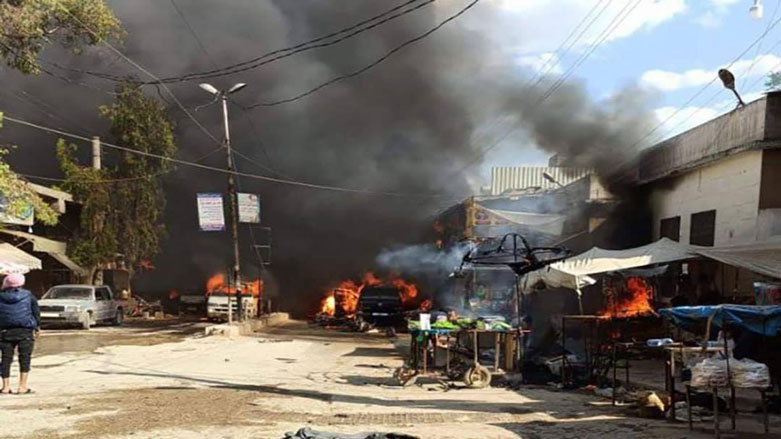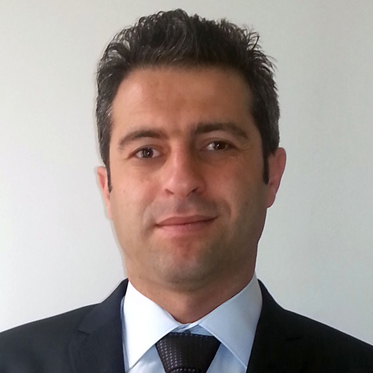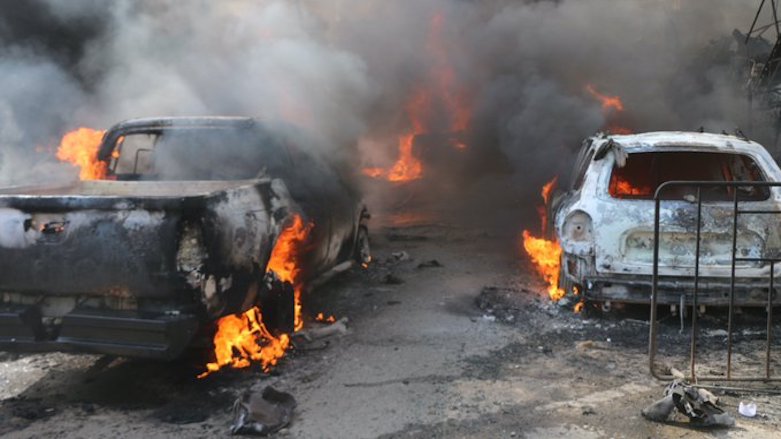US condemns terrorist attack in Syria’s Afrin amid Turkish-Kurdish accusations

QAMISHLI, Syria (Kurdistan 24) – Late on Tuesday, the United States condemned a truck bombing earlier that day that killed at least 40 and wounded dozens more at a crowded market in the northern Syrian city of Afrin as Turkey and a local Syrian Kurdish administration exchanged accusations over responsibility for the deadly incident.
State Department spokesperson Morgan Ortagus said in a statement that US strongly denounced the act of terror against civilians who were shopping as they prepared to break the Ramadan fast.
Read More: Oil truck bombing in Syria’s Afrin kills at least 40, including 12 children
“Such cowardly acts of evil are unacceptable from any side in this conflict,” she said, adding, “The U.S. renews its call for support and implementation of a nationwide ceasefire in Syria, as called for by UN Special Representative Geir Pedersen.”
The initial appeal issued in late March by UN Secretary-General Antonio Guterres, later championed by the Kurdish-led Syrian Democratic Forces (SDF) and various international leaders, urged warring parties across the world to “lay down their weapons to support the bigger battle against COVID-19.”
Read More: Syrian Kurds back Macron's initiative for UN ceasefire plea during pandemic
So far, there has been no claim of responsibility from any side of the conflict, but the first immediate response was by Turkish state-run TRT and Anadolu news agencies which accused the Kurdish People’s Protection Units (YPG) of carrying out the explosion.
Afrin has been controlled by a Turkish-backed Syrian militia, often known as the Syrian National Army (SNA), since March 2018 when the Turkish army launched its cross-border offensive on the Afrin region to target the Kurdish People’s Protection Units (YPG) which had been prominent in the area since 2012.
Ankara considers the YPG a terrorist organization and an offshoot of the Kurdistan Workers’ Party (PKK), a group that has waged a decades-long insurgency against Turkey for expanded Kurdish rights.
The Kurdish self-administration in northeast Syria, spearhead by the YPG-led Syrian Democratic Forces (SDF), also condemned the attack and rejected the Turkish accusations.
Read More: Syrian Kurds condemn ‘terrorist act’ in Afrin
“We in the Syrian Democratic Council condemn and denounce this cowardly terrorist act that targeted innocent civilians and threatens the remaining ones to move and leave their villages and cities,” the SDC, the political wing of the SDF, said in a public statement.
Elsewhere, the SDF’s Commander-in-Chief, General Mazloum Abdi, condemned the “terrorist act” that led to the loss of innocent lives in a post on Twitter.
The SDF chief suggested the criminal act was a product of the policy of “destruction pursued by the Turkish occupation and its mercenaries.”
Abdulkarim Omar, the foreign relations chief of the Kurdish-led administration that runs the northeastern quarter of Syria, suggested the bombing aimed to “displace the rest of its indigenous population.”
“The international community must condemn this act of terrorism, and pressure [the] Turkish state to withdraw from Afrin and all the occupied areas [in Syria],” Omar wrote on Twitter.
Additionally, activists in Afrin blamed Turkey and its allied Syrian opposition militias to be responsible for the attack.
There were no explosions in Afrin before the Turkish invasion in 2018 but after Afrin region was occupied by Turkey, there are explosions almost every two weeks,” an activist living in Afrin told Kurdistan 24 on condition of anonymity.
Another activist in Afrin added that explosions are planned by the Turkish-backed groups with the aim of spreading confusion and panic among the indigenous Kurdish residents of Afrin as part of a greater anti-Kurdish program of ethnic cleansing.
Hours before the explosion on Tuesday, the official US commission charged with monitoring international religious freedoms has called on the US government to pressure Turkey to leave Syria due to its human rights violations against religious minorities in multiple areas, with Afrin mentioned prominently.
Read More: US commission calls on Washington to pressure Turkey to leave Syria
The US Commission on International Religious Freedom (USCIRF), in its annual report, called on Washington to “exert significant pressure on Turkey to provide a timeline for its withdrawal from Syria.” The report also said that the US should ensure “that neither its military nor FSA allies expand their area of control in northeast Syria, carry out religious and ethnic cleansing of that area, or otherwise abuse the rights of vulnerable religious and ethnic minorities there.”
In February 2019, the United Nations’ Independent International Commission of Inquiry on Syria released a report charging that armed groups in Afrin were guilty of war crimes including “hostage-taking, cruel treatment, torture, and pillage.” It stated that “the most common violations perpetrated in Afrin involved frequent abductions by armed groups and criminal gangs.”
Read More: UN report suggests Turkish-backed groups commit war crimes in Afrin
As recently as early March of this year, the commission again released evidence that it had found reasonable grounds to believe that the militias “perpetrated the war crime of murder and repeatedly committed the war crime of pillaging, further seriously contravening the right to enjoyment of possessions and property.”
So far in April, there have been three car bomb attacks in Afrin, including the one that occurred on Tuesday.
On April 19, six civilians were injured in an explosion that occurred near a recently-established bridge in the center of Afrin city that was caused by another vehicle-borne improvised explosive device (VBEID) that was attached to a Suzuki car.
Another oil tanker explosion on April 8 injured three civilians in Afrin's Ashrafiyah neighborhood.
Editing by John J. Catherine

